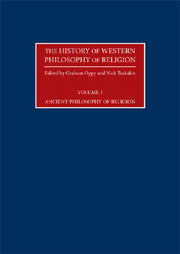Book contents
- Frontmatter
- Contents
- Editorial Introduction
- Contributors
- 1 Ancient Philosophy of Religion: An Introduction
- 2 Pythagoras
- 3 Xenophanes
- 4 Socrates and Plato
- 5 Aristotle
- 6 Epicurus
- 7 The Stoics
- 8 Cicero
- 9 Philo of Alexandria
- 10 The Apostle Paul
- 11 Plutarch of Chaeroneia
- 12 Sextus Empiricus
- 13 Early Christian Philosophers: Justin, Irenaeus, Clement of Alexandria, Tertullian
- 14 Origen
- 15 Plotinus
- 16 Porphyry and Iamblichus
- 17 The Cappadocians: Basil of Caesarea, Gregory of Nazianzus, Gregory of Nyssa
- 18 Augustine
- 19 Proclus
- 20 Pseudo-Dionysius
- Chronology
- Bibliography
- Index
19 - Proclus
- Frontmatter
- Contents
- Editorial Introduction
- Contributors
- 1 Ancient Philosophy of Religion: An Introduction
- 2 Pythagoras
- 3 Xenophanes
- 4 Socrates and Plato
- 5 Aristotle
- 6 Epicurus
- 7 The Stoics
- 8 Cicero
- 9 Philo of Alexandria
- 10 The Apostle Paul
- 11 Plutarch of Chaeroneia
- 12 Sextus Empiricus
- 13 Early Christian Philosophers: Justin, Irenaeus, Clement of Alexandria, Tertullian
- 14 Origen
- 15 Plotinus
- 16 Porphyry and Iamblichus
- 17 The Cappadocians: Basil of Caesarea, Gregory of Nazianzus, Gregory of Nyssa
- 18 Augustine
- 19 Proclus
- 20 Pseudo-Dionysius
- Chronology
- Bibliography
- Index
Summary
The question of the contribution of Proclus (411–85) to the history of Western philosophy of religion is complicated by the fact that Proclus would not himself have distinguished philosophy of religion as a distinct sub-branch of philosophy. When we moderns think about this subject, we think about it as the philosophical study of religious phenomena, and in particular the assessment of the truth-claims made explicitly or implicitly by various religions. In this way, philosophy and religion have different goals. The goal of philosophy is truth, and the specific goal of philosophy of religion is an assessment of the truth of various propositions about God or the afterlife. The goal of religion, if we may speak this way, is not merely truth, but salvation and a godly life.
It seems unlikely that Proclus would have recognized either of these divisions: that between philosophy of religion and the broader area of metaphysics or that between philosophy and religion itself.
The first point is one that should by now be familiar. Lloyd Gerson (1990) makes the point that theologia in ancient Greek philosophy generally is best thought of as part and parcel of the attempt to give an account of the first principles (archai) of things. Hence metaphysics or ‘first philosophy’ in Aristotle coincides with theology (Metaphysics E.1, 1026a24–33).
- Type
- Chapter
- Information
- The History of Western Philosophy of Religion , pp. 263 - 276Publisher: Acumen PublishingPrint publication year: 2009
- 1
- Cited by



